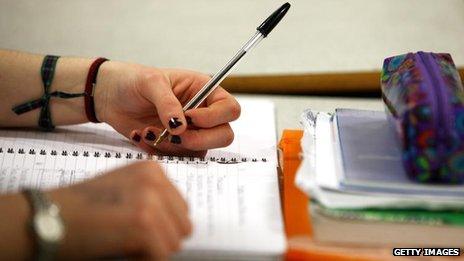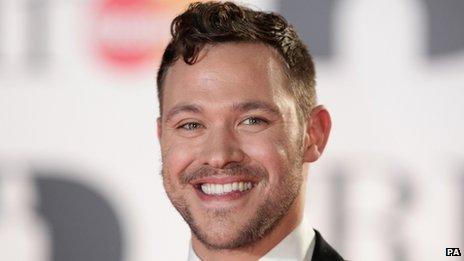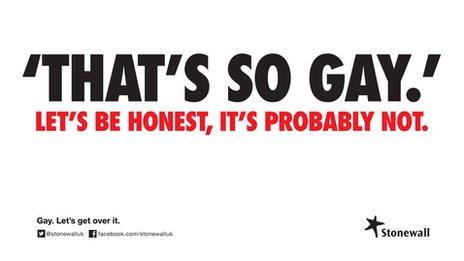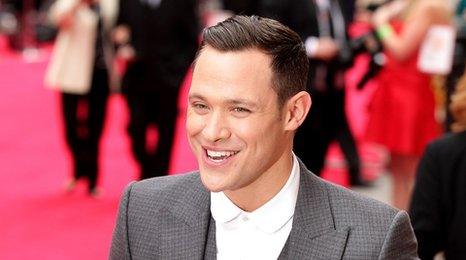Gay pupils insulted by homophobic phrases used at school
- Published

Nearly all homosexual teenagers say they hear the word "gay" being used as an insult, according to research, external carried out by Stonewall.
Of the 1,600 pupils interviewed 99% said they had heard homophobic language used regularly.
Eighty-four per cent said they were upset by gay being used as an insult.
Gay, lesbian and bisexual charity Stonewall is launching a poster campaign this week, fronted by Will Young, to tackle the problem.
Copies of the new posters and guidance are being sent to around half of all secondary schools in England, Scotland and Wales.
Wayne Dhesi, from Stonewall, says school children need to be taught that misusing the word gay is wrong.
"People hear phrases such as, 'That's so gay' and 'You're so gay' being used to describe something that's negative or defective," he said.
"It perpetuates the stereotype that being gay, lesbian or bisexual is somehow wrong.
"Stonewall knows that it's a huge task to get that figure down but we would like to think that the campaign that we're launching today is a start."
More than half, 55%, of lesbian, gay and bisexual pupils told Stonewall that they had experienced direct bullying.

Will Young is fronting Stonewall's anti-homophobia poster campaign
Rhoderi is in year eight and says he has heard people calling other pupils "gay".
"I know that the old fashioned word is happy, but I know that it also means a homosexual person," he said.
"Sometimes people use it as an insult, 'Oh you're so gay' or something like that.
"Sometimes people just get a bit angry and it's like the first word that pops into their head. It can mean, 'That's rubbish' or 'You're a scaredy cat'."
Ten per cent of pupils said teachers got involved every time they heard the word being used.
Assistant head teacher Anna Williams says they need to explain to pupils why using the word gay as an insult is inappropriate.
"What's important when you hear the word gay being used is that you're really consistent," she said.
"So that's making it really clear to the students that it's unacceptable and bringing it up straight away.
"It's often having that chat with the student and explaining to them that it shouldn't be used and equating it with words of race or language of disability that they might use that they know is unacceptable."

Three different anti-homophobia posters are being sent to schools
English teacher Sophie Baker says she hasn't picked up on it much in the past.
"I don't hear it, but then again I'm not in the playground," she said. "In lesson, no, I don't hear it. I really don't think I have.
"It's probably something that goes over my head. I'm not hearing a swear word, I'm not hearing obvious bullying and so it's not something maybe I'm picking up on.
"It certainly will be something I'm looking out for now."
Follow @BBCNewsbeat , externalon Twitter
- Published13 October 2013
